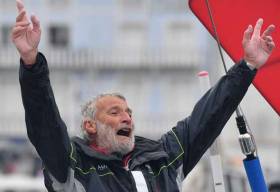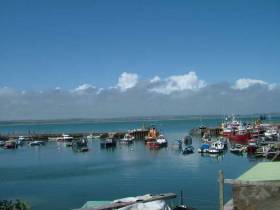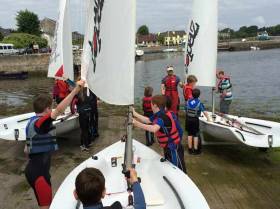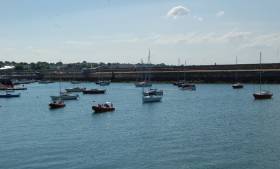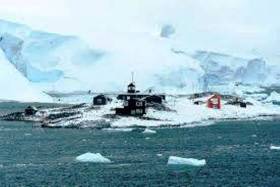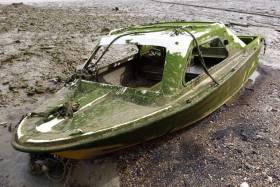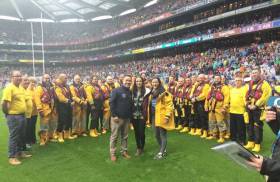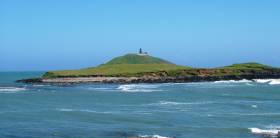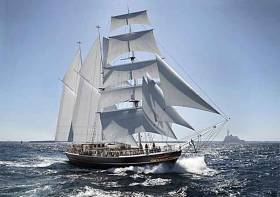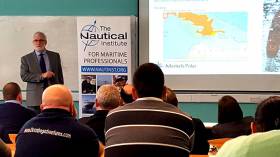Displaying items by tag: Tom MacSweeney
Solo Sailing in Irish Waters
I enjoyed watching world sailing history being made this week as 73-year-old Jean-Luc Van Den Heede became the oldest man ever to complete and win a solo non-stop round-the-world race. After 212 days alone at sea he won the Golden Globe Race, finishing in Les Sables d’Olonne in France from where he had started last July and which is also his home port.
I enjoy a little bit of solo sailing myself and, considering the number of top solo sailors from France and the races which start from there, the sport and that section of it get a lot of support.
Watching the big blue spinnaker push Jean Van Den Heede in his 36-foot. Rambler, across the finish line on Tuesday morning in a turbulent sea, accompanied by a flotilla of boats, with hundreds of spectators ashore, I thought - “that should make a point about ageism and underline that sailing really is a “sport for all ages…”
The Golden Globe Race marked its 50th anniversary and the single-handed French Figaro Race, including Irish sailors Tom Dolan and Joan Mulloy will mark its golden jubilee in Irish waters this Summer, with the opening leg of the three-race series from Nantes to Kinsale and a start from Kinsale to Roscoff. Other Irish solo sailors have also shown their abilities internationally.
"solo sailing here is still subject to Marine Notice No.24 issued in 2005"
But solo sailing here is still subject to Marine Notice No.24 issued in 2005, thirteen years ago, warning about solo sailing, which is still in effect. At least when I searched the Department’s website this week, I couldn’t find any indication that it had been withdrawn.
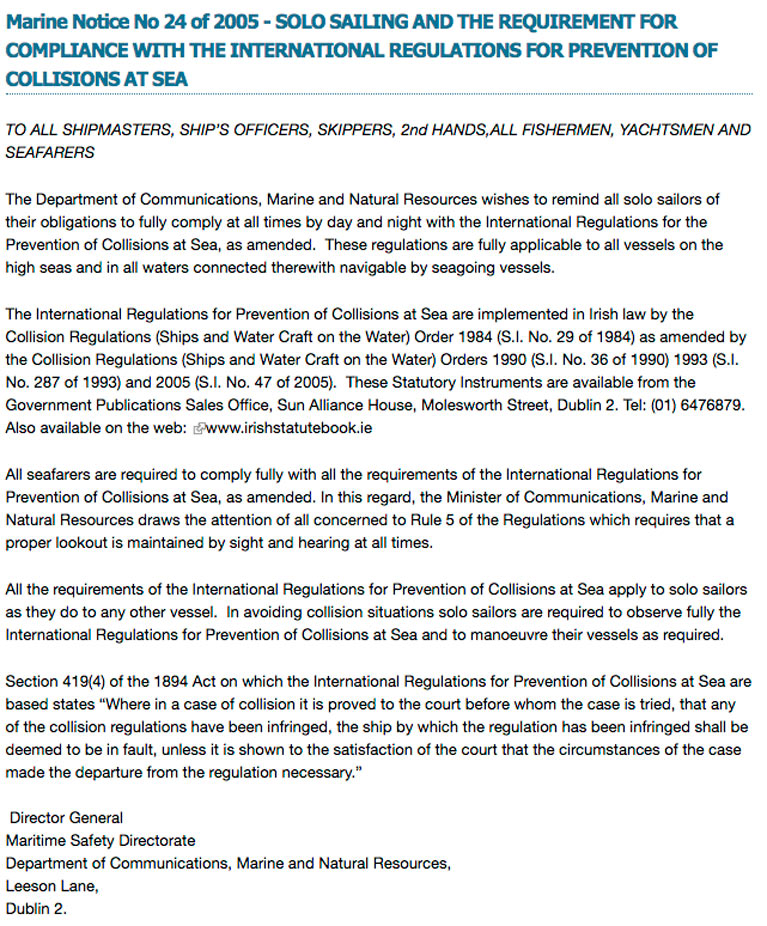 Marine Notice No.24 issued in 2005
Marine Notice No.24 issued in 2005
It was controversial at the time, being interpreted as imposing a ban on solo sailing,, though it didn’t say exactly that. It warned about the requirement under the ColRegs – the International Regulations for Prevention of Collisions At Sea to “keep a proper lookout by sight and hearing at all times….”
I like a bit of quiet solo sailing myself aboard my Sigma 33 Scribbler in Cork Harbour and I’m very careful to keep a proper lookout, as there are a lot of commercial shipping movements in the harbour which have right-of-way. I’m also careful of insurance warnings I’ve seen about sailing alone. I’ve met like-minded sailors on the water and seen some racing solo when they couldn’t get crew.
Contrasting that with what I heard Tom Dolan describe in his series of club talks, makes me marvel at the ability of solo sailors.
Marine Notice No.24 of 2005 took a stern stance if a proper lookout wasn’t kept. The issue seems to be whether single-handers can do so effectively, especially when needing sleep. But one Coast Guard statement said that venturing to sea or on the water alone was “neither safe nor conducive to good seamanship."
The Marine Notice applied to “all vessels on the high seas and in all waters connected therewith, navigable by seagoing vessels.” That would include inshore waters and Cork Harbour and my Sigma is, potentially, “seagoing…”
Safety on the water must be taken seriously and an accident while alone can result in a dangerous situation.
The regulation is a warning about solo boating, including sailing, in Irish waters.
Are you aware of it?
Listen to the Podcast here
RNLI Safety Message is One That Everyone Should Take to Heart
Hello and welcome to my weekly Podcast …. Tom MacSweeney here ….
Ireland’s State commitment to maritime safety has been strongly questioned. Safety must not be taken casually and, at the start of a New Year, when most leisure craft are off the water, it is an appropriate time to reflect – and think….
Betelgeuse tragedy at Whiddy Island
The big maritime story this week has been the 40th commemoration of the Betelgeuse tragedy at Whiddy Island in Bantry Bay. It has been the focus of the national media, where maritime tragedy always invokes big coverage, but where regular maritime coverage is sadly lacking.
I focus on it because I was the first reporter, for RTE at the time, on the scene if that tragedy in Bantry and it is one I can never forget.
In my mind’s eye, as I write these words, I can still see that scene in the early hours of the morning of January 8, 1979, between 2 and 3 a,m., as I stood in the town square. Overhead the sky was red. There was a palpable sense of fear as explosions and flames leapt into the sky from nearby Whiddy Island where the huge oil tanker, Betelgeuse had exploded and broken apart. The sky reddened, as local people clustered together, hearing that 50 had been killed.
Later investigations would reveal serious shortcomings in safety issues……which became the renewed focus of attention this week. There have been changes and improvements and safety has become more focussed upon at all maritime levels. I was in Bantry at the commemoration ceremonies and it was clear that there remains a lot of anger about the tragedy and particularly about the safety issues.
I looked out across the flat, calm and pleasant waters of Bantry Bay in the mildest of January weather during the ceremonies and recalled sailing those waters in 12ft.Vagabond dinghies from Monkstown Bay Sailing Club, in company with the Bantry Club, whose premises were just behind me. I sailed there on the Bantry Longboat, part of the Atlantic Challenge, thought of times I spent on Whiddy Island, of boarding huge oil tankers from a pilot boat as they arrived in the Bay, climbing ladders lowered from the deck as I reported on shipping stories… and I recalled that awful early morning 40 years ago…
Access to the water
Access to the water is a wonderful opportunity in Ireland, where there is still a freedom to become involved, but that it must be used wisely. Leisure boating does allow people with no maritime experience or skills of any kind, to go afloat without adequate preparation. It is wise to be prepared, to learn, to be safe. Ashore, people walk the cliffs and the shoreline, fish from areas where they may not realise the dangers inherent in the location they are using. A New Year message from the lifeboats, RNLI is one that everyone should take to heart.
Listen to the Podcast below and why, as an island nation, “WE ARE NEVER TOO FAR AWAY FROM THE WATER” ……. Niamh Stephenson of the RNLI has been telling me why….
Kinvara Bay Sailing Club Gearing Up in Galway
On last week’s Podcast I wrote about the great Galway Hookers at the ‘Cruiniú’ – the Gathering of the Boats in Kinvara County Galway, a centre of traditional wooden boats. There are other boats sailing in the waters off Kinvara these days – modern glassfibre dinghies.
This is the fleet of Kinvara Bay Sailing Club, which followed the path of wooden boats when it was formed in 2004 to encourage the development of sailing and associated skills in and around the area. The Heron dinghy was the initial dinghy of choice, because it was wooden, maintained that traditional boating interest and could be built by members. During the following year 12 Herons were built in the village and more purchased by families leading to a healthy fleet of 19 in total which led to the village being regarded as having the biggest local fleet of Herons in one club in Europe, so it was said.
Time has moved on in the sailing world and the club fleet now consists of modern glassfibre boats such as Picos, Fevas, Argos and a mix of other craft.
The club holds twice-a-week sailing on Thursdays and Sundays from Parkmore at the mouth of Kinvara Bay and prides itself on being strongly family-oriented, with a concentration on encouraging participation in the sport. Boat sharing and introductory sailing for adults, as well as coaching for younger and beginner sailors is provided.
On my radio programme, broadcast from Kinvara, in conjunction with Kinvara FM, I had the pleasure of meeting the current Club Commodore, Paul Crowley. He credits a lot of the success of revitalisation in the club to the interest of young sailors in Kinvara. Paul is brother of Peter Crowley of the RCYC in Cork and the ISA and RNLI Council. I also met a former Commodore, Barry Kavanagh, who was involved in the initial development of the club and the building of Herons, one of which he built himself. He is also a broadcaster on Kinvara FM whose strong interest will be a help to the sport in the area.
The first voice you hear on this week’s Podcast is Paul Crowley and then Barry Kavanagh. Listen in below.
Are Sea Area Forecasts Necessary?
In this digital age, with so many available resources providing sea area weather forecasts, is there still a need for national radio to broadcast these forecasts?
I heard an RTE Radio Presenter asking a Met Eireann meteorologist on-air whether there was any point in broadcasting weather forecasts for the marine sector any more, because there was so much detailed weather information available online.
It reminded me of the battles I had with RTE Radio managers and schedulers when they came up with their idea of ending such weather forecasts altogether, because they took up broadcast time which could better used.
I was Marine Correspondent with RTE then so the conversation a few weeks ago between the RTE Presenter and Met Eireann reawakened my memories of those internal RTE disagreements and underlined for me how badly served the maritime sector is by the national media, both broadcast and print.
It also underlines why the BBC Radio Shipping Forecasts are popular amongst Irish fishermen, mariners, professional, commercial and leisure – because it’s a specialised service to the marine sector that RTE doesn’t provide in the same way.
The coastal radio stations of the Coast Guard give weather forecasts which are available at sea, thankfully, but the mindset of the RTE Presenter showed it was closed to around Dublin and Montrose and unaware of the reality of life, particularly in the maritime sector and the coastal communities, outside of urbanisation.
The Met Eireann Meteorologist told the RTE Presenter that there are coastal areas around the Irish shorelines and at sea where there is no internet access and not even a reliable mobile phone signal and that there is still dependence on the State broadcaster for the forecast.
That is a viewpoint I agree with, but one could add that the ‘independent broadcasters,’ those who are also described as national ‘commercial stations’ should also consider.
There has been a demand from the non-State public service broadcaster for a share of the licence fee, but that should also bring responsibilities, such as a sea area forecast for mariners.
Listen to the Podcast below:
Is Antarctica Safe for Cruise Ships?
There’s increasing concern about cruise ships in the Antarctic and whether people could be rescued should one get into trouble amidst the ice. 300 ships traverse that Polar region, with nearly a quarter-of-a-million tourist visitors aboard from November to March every year. The international search-and-rescue station in the region is operated by the Chilean Navy and named after the first Chilean Head of State and legendary revolutionary leader, Bernardo O’Higgins, whose father was from County Sligo. It’s the only permanent Chilean base on the Antarctic mainland, located on Puerto Covadonga since 1948.
More cruise lines are offering trips there and there is more and more pressure on the area from tourists and from demands for exploration.
Two weeks ago I met the seafarer who took the largest ice-breaking vessel through the ice at the earliest possible time of the year this year. It was a historic journey. So this week on my Podcast, when I bring you a selection of items from my radio programme THIS ISLAND NATION, I’m taking you to the Polar regions and to that unique SAR rescue station.
Also on this PODCAST edition, I was shocked to hear what Dr.Simon Berrow, Chief Science Officer of the Irish Whale and Dolphin Group, had to tell me about the damage which plastic in the oceans is doing, particularly to whales.
As I walk along the shore at Monkstown in my home village in Cork Harbour I see more marine debris washing in, particularly plastic. Do you see the same in your part of the coast.
What Dr.Berrow has to say should make us all think….
Listen to the Podcast below
Tom MacSweeney presents the maritime programme, THIS ISLAND NATION
United Nations Marine Safety Agency To Examine Disposal Of Fibreglass Yachts & Boats
The International Maritime Organisation, that’s the United Nations agency for safety at sea, has acknowledged, the first time this has been publicised, that a large number of abandoned or no-longer usable fibreglass vessels - including fishing vessels and leisure craft – are being dumped at sea each year, possibly due to a lack of land-based disposal facilities.
The IMO, as it is known, told me so after I enquired, following a previous podcast about the disposal of fibreglass yachts, about the envirornmental aspects of disposing of what are, basically, plastic boats.
When I raised the subject around Irish boating circles, no one seemed to be sure how long plastic boats will last for…
Fibreglass is a highly recyclable material, the IMO told me and said that the technology for recycling fibreglass already exists, but the logistics of handling the large amounts of fibreglass hulls from abandoned or derelict vessels poses a significant challenge.
So, the IMO has decided to carry out a study which it says is “to collate information on the scale of the problem of disposing of fibreglass vessels” and to identify “key knowledge gaps relating to impacts of fibre reinforced plastic vessels dumped or placed in the marine environment.”
It seems that no one realy knows what to do with them at the present time.
Scientific research will be hired to report on whether such vessels could be disposed of in the sea in a safe and environmentally sound manner and whether “guidance” should be developed on the disposal of fibreglass vessels.
Seems like a potential problem is being identified.
Listen to the Podcast below
Tom MacSweeney presents the maritime programme, THIS ISLAND NATION
RNLI 'Respect the Water' at the GAA All Irelands, Croke Park
RNLI Lifeboat crews on the hallowed turf of Croke Park, unfurling huge flags with a message about water safety in front of 67,000 passionate football supporters seems an unlikely activity, but it was achieved just before the teams they were supporting did battle in the All-Ireland semi-final between Mayo and Kerry yesterday.
I am a dedicated supporter of the RNLI and believer in the importance of getting the message of water safety across to the public. Those involved in the marine sphere hear and see the message regularly, but getting it out to the general public is more difficult.
Though indeed, from the number of emergency calls for help necessitating the launching of lifeboats in recent weeks to yachts and other leisure craft, reinforcing that message will be of benefit.
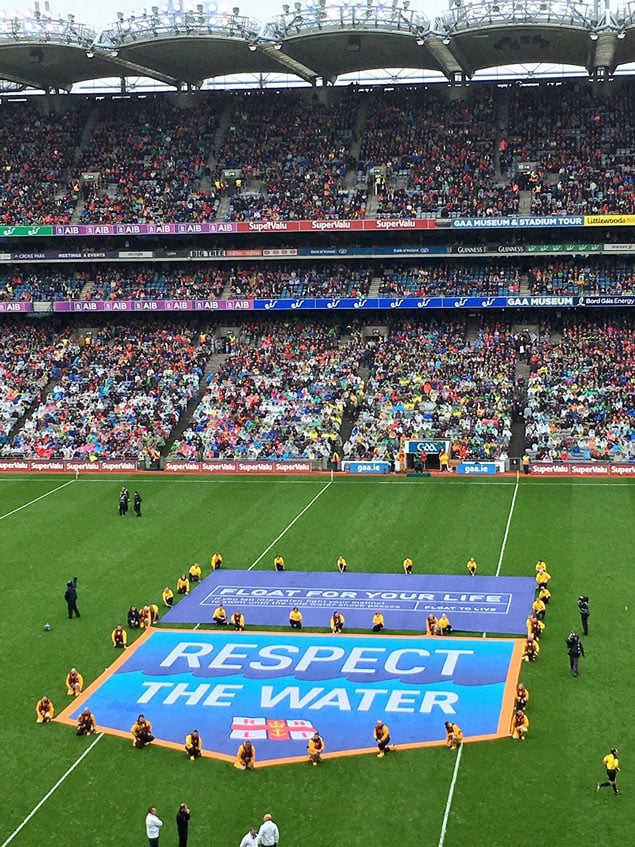 The RNLI 'respect the water' slogan is rolled out at Croke Park
The RNLI 'respect the water' slogan is rolled out at Croke Park
The GAA has been of great assistance to the RNLI in getting the message – Respect the Water - out through its clubs all over the country, in a partnership with the lifeboat service. At the All-Ireland semi-final the opportunity to do so, in front of the huge crowd and big media presence, including television, the GAA provided a marvellous opportunity to convey the message in the widest fashion to the public. I asked Niamh Stephenson, Public Affairs Manager of the RNLI, to describe what happened. Her report will be broadcast this week on my radio programme, THIS ISLAND NATION.
In advance, for Afloat.ie readers, this is how she describes what happened:
Ballycotton Island on the East Cork Coastline & Eloping by Semaphore
A few weeks ago I rounded Ballycotton Island on the East Cork coastline, sailing beneath the iconic, dramatic black lighthouse which towers 195 feet above sea level. It was erected in 1851, the construction led by the renowned engineer George Halpin who, as Inspector of Lighthouses, established 53 of them and modernised another 15.
As the wind died away our Sigma 33, SCRIBBLER, needed the reaching spinnaker hoisted to get across Ballycotton Bay to the finish line off the small harbour’s pier wall. It was the re-establishment of the annual race from the Royal Cork Yacht Club in Crosshaven to Ballycotton.
That distance is about a nautical mile and, relaxing afterwards over refreshment in the village, I heard the tales of how Lightkeepers on the island, in the days before modern communications, kept in touch with their wives living ashore…. by semaphore, the signalling system invented by Frenchman, Claude Chape, in 1792 as a “visual telegraph,” using crossbars with pivoting arms on top of towers. Napoleon used it to communicate strategy to his armies. The British Royal Navy developed naval flag semaphore which they used to defeat the French at the Battle of Trafalgar.
But it is unlikely that either Chape, Napoleon or the British, envisaged semaphore helping a Lightkeeper to elope with another Lightkeeper’s daughter…This story I narrated, subsequent to the race, on a documentary about Ballycotton Lighthouse and its Keepers produced by Community Radio Youghal Programme Director, Justin Maher, in which Ballycotton Historian, Derry Keogh, a guide with the community project, Ballycotton Lighthouse Tours, revealed another use for semaphore:
Listen to the PODCAST below.
• Tom MacSweeney presents THIS ISLAND NATION radio programme
Back in June I asked if there was sufficient joined-up thinking about the project for a new Irish tall ship – and why the Naval Service hasn’t taken a more active role in Irish sail training over the years, with advantages to itself, comparable to what the Royal Navy does in Britain…you can read that story here.
Neil O’Hagan, Executive Director of the Atlantic Youth Trust, organisers of a new national tall ship project, sent me an email saying that it is good to see discussion about the project so that it gets attention… but that “there is more going on than meets the eye…”
On this week’s Podcast, I indicate that I am glad to hear that, but I have reservations and will be convinced about actual Government support when I see it delivered…
Listen to the Podcast below…
A ”Truism” is defined as a self-evident truth. That underlines the accuracy of the descriptive saying “out-of-sight-out-of-mind” and the application nof it to the attitude of the Irish Government towards seafarers.
Every day Ireland’s ports are depended upon by the public, all of us who live ashore. But those ports would not operate without ships and the ships would not operate without seafarers. Neither the Government, nor the great majority of the public, fully appreciate seafarers.
In an island nation, which we are, our economy would die without them. 95 per cent of our exports and imports move by sea.
So how much value is placed upon seafarers and the fishing industry by the general public?
These thoughts come to mind as the INTERNATIONAL MARITIME ORGANISATION, which is the United Nations body dealing with marine affairs, has announced that Sunday, June 25, will be WORLD DAY OF THE SEAFARER.
The theme is to be that “SEAFARERS MATTER”.
The President of the worldwide Nautical Institute, the international representative body for maritime professionals involved in the control of sea-going ships, Capt. David ‘Duke’ Snider told me: “There is never a day when there aren’t ships moving cargo and people across the oceans, thousands of seafarers in hundreds of ships on seas all over the world, every day of every year, but they are out-of-sight, out-of-mind, to those who need them most and that’s everyone who lives on land. World trade couldn’t be carried on without them. There would be no oil to fuel transport, to power industries, to generate electricity, to heat homes. There is so much the world would not have if seafarers didn’t bring the supplies that those who live ashore need for their lives.”
The INTERNATIONAL MARITIME ORGANISATION is encouraging Governments to recognise the “unique contribution” made by seafarers all over the word to international trade and the world economy.
The Irish Government has not recognised or celebrated World Day of the Seafarer in past years.
It would be encouraging if it did so, but on past performance I will not hold my breath that it will do so.
• Listen to the comments of the President of the Nautical Institute below:



























